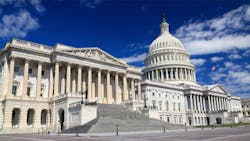Congress can lower taxes on manufacturers and make them more competitive by passing a long-delayed Miscellaneous Tariff Bill, the National Association of Manufacturers and its members will be telling Congress in a lobbying effort today.
NAM has been pushing for passage of the MTB, which reduces or suspends import duties on a range of raw materials and intermediates used by manufacturers in the U.S. Typically, these products are not available domestically and the rationale for reducing the tariffs is that they make the products cheaper and thus help the competitiveness of U.S. manufacturers. The most recent MTB legislation expired at the end of 2012.
Despite bipartisan support for these bills in the past, Congress has been unable to push a new MTB through, as NAM Vice President of International Economic Affairs Linda Dempsey noted, at considerable cost to manufacturers.
“This is costing us $748 million in unneeded taxes on manufacturing. It has very severe economic impact on our companies and the broader economy.”
One of the manufacturers who said they are hurt by the lack of Congressional action is Albaugh Inc., which produces agricultural chemicals at a facility in St. Joseph, Mo. Albaugh Vice President Stuart Feldstein told a press call today:
“This is a very costly delay for our company. We are in the business of producing off-patent pesticide products. In that industry, it is very important that we control our costs so we can offer our products at the best possible price to our customers. Not having the MTB is costly us approximately $1 million annually.”
MTB plays an important role in DuPont maintaining manufacturing jobs in the U.S., said Elaine Olsen, program manager for international trade.
“We have 2/3 of our manufacturing within the U.S. and it supports half of our workforce… this is critically important to us as a means to protect and preserve those jobs in the U.S., as well as the opportunity to continue to reinvest in new technologies as we support our strategic priorities for the years ahead.”
One of the chief arguments against MTB has been that it amounts to an earmark, which Republicans vowed to oppose in 2010. Since each duty suspension is introduced as a separate bill, the argument goes, the lobbying of Congress for these bills by individual companies differs little from the earmark process. Sen. Jim DeMint, R-S.C., who opposes the current process, wrote on CNN:
“Some want to restart this part of the political favor factory and hope Americans don't notice Republicans breaking their own earmark ban, and others want to redefine earmarks to create a loophole for tariff suspensions. But the whole purpose of the earmark ban was to change the way we do business, not to change the definitions and rules of earmarks to pretend bad behavior is suddenly alright.”
DeMint, along with Sen. Claire McCaskill, D-Mo., has introduced a reform bill that would have manufacturers directly petition the International Trade Commission rather than go through Congress.
No less a budget hawk than Grover Norquist, however, says the duty relief in MTB is the exact opposite of an earmark. Norquist wrote in The Washington Times:
“They are not spending bills; they are tax cuts, period. No federal money is spent on their enactment. While earmarks favor only a special few, the tariff-tax cuts benefit wide swaths of American industry and help create U.S. jobs and economic growth.”
Albaugh’s Feldstein echoed that view, noting:
“Our company is living proof that this is not an earmark. We had been using the MTBs for years when the process was working…We’re evidence that these aren’t bills for one company. They are generally available.”
Despite a delay of roughly 18 months in passing a new MTB, NAM’s Dempsey said there has been a great deal of discussion about the bill. “We are increasingly optimistic that there will be a path forward here,” she said, indicating the belief that a bill will be passed in 2014.
About the Author
Steve Minter
Steve Minter, Executive Editor
Focus: Leadership, Global Economy, Energy
Call: 216-931-9281
Follow on Twitter: @SgMinterIW
An award-winning editor, Executive Editor Steve Minter covers leadership, global economic and trade issues and energy, tackling subject matter ranging from CEO profiles and leadership theories to economic trends and energy policy. As well, he supervises content development for editorial products including the magazine, IndustryWeek.com, research and information products, and conferences.
Before joining the IW staff, Steve was publisher and editorial director of Penton Media’s EHS Today, where he was instrumental in the development of the Champions of Safety and America’s Safest Companies recognition programs.
Steve received his B.A. in English from Oberlin College. He is married and has two adult children.
